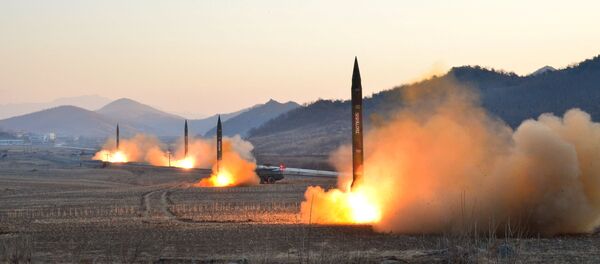Acting head of the US State Department's press service Mark Toner was quick to say that Beijing's proposal is about "completely different things," while Moon Sang-gyun, spokesman for South Korea's Defense Ministry, said that "the joint exercises will continue without a halt; it is a purely defensive annual drill."
On Monday, media reports said that North Korea had carried out multiple launches of medium-range ballistic missiles. Out of four missiles, three landed 300-350 kilometers (186-217 miles) from Akita Prefecture, located in the northwest of Japan's main island of Honshu.

One missile landed about 200 kilometers (around 124 miles) from the prefecture, the closest a North Korean missile has come to Japan in the history of the country's missile launches, the broadcaster NHK reported on Thursday, citing a government analysis.
After Washington rejected Beijing's initiative, the possibility of a worst-case scenario escalation with North Korea has increased, Azhdar Kurtov, an expert at one think-tank, the Russian Institute for Strategic Studies, told Sputnik China.
"The next several weeks will see increasing tensions between the sides. The new American President has apparently decided that it was time to refer to the use of force by holding military exercises [with South Korea] and sending an additional contingent of US warships to the Korean Peninsula," Kurtov said.
"As for Pyongyang, it will not abandon its course because North Korea's authorities have the vivid example of recent events in Libya and Iraq, where the US violated international law and carried out a military intervention against sovereign states," Kurtov said.
According to him, if the leadership of Libya and Iraq had nuclear weapons, the situation would have developed in line with different scenario; the Americans would not have dared to kick off an open military intervention."
In an interview with Sputnik China, expert Konstantin Asmolov of the Moscow-based Institute of the Far East, said that even though the situation is aggravating, the Trump Administration's refusal to sit down with Pyongyang hasn't been the lowest point of the current round of tensions.
"Much more importantly, it is the deployment of the US THAAD missile defense system in South Korea, not North Korea's missile launches, that will deteriorate the situation in the region," Asmolov said, adding that he doesn't rule out Beijing's military confronting the US and South Korea given, thatTHAAD is directed against China rather than Pyongyang.
He was echoed by expert of the Diplomatic Academy of China Ren Yuanzhe, who told Sputnik China that the regional situation may be further exacerbated, especially against the swift deployment of the THAAD system in South Korea and the US- South Korean war games.
"At the same time, it is in the interests of various parties to maintain peace and stability on the Korean Peninsula. In this vein, China's initiative to return the sides to the negotiating table is the only way tio resolve the Korean Peninsula-related problems and achieve long-term security in the region," Yuanzhe concluded.
Never miss a story again — sign up to our Telegram channel and we'll keep you up to speed!







